Node.js, Node JS, or simply Node is a powerful runtime environment for building the backend of web applications. With Node.js, developers can write JavaScript on the client-side and the server-side or technically everywhere.
The performance Node JS provides is also highly impressive. Unsurprisingly, Node JS has become immensely popular in the web development world, particularly among large enterprises like Netflix, Uber, and PayPal.
Hence, if you want to build a high-performance or enterprise web app in 2022 and beyond, you should master Node JS.
As of 2023, Node JS remains a lucrative skill. According to Payscale, an average developer who possesses the skill earns as much as $92000 per year in the US, while an experienced web developer could earn as high as $123000.
You can master Node JS by taking high-quality online courses, which will explain the concepts and provide tips & techniques, along with several projects to complete. Upon course completion, you will have the skills to develop advanced web applications.
However, you should not take any random Node JS courses. Most online Node JS courses lack sufficient practical content. You could end up spending time and money to no avail.
I hence decided to create a blog post that only features the Node JS online courses that I found beneficial. You can then select the one that suits your learning style and get started right away.
Affiliate Disclosure: This post from Victory Tale contains affiliate links. If you purchase an online course through them, we will receive a small commission from the providers.
Nonetheless, we always value integrity and prioritize our audience’s interests. You can then rest assured that we will present each course truthfully.
Things You Should Know about Node JS Courses
Prerequisites
Node JS is not for absolute beginners. You should have knowledge of the following before taking the course.
- Basic JavaScript Programming (variables, functions, OOP, and other core JavaScript concepts)
- Modern JavaScript (ES5+)
- Command Line (Terminal)
Criteria
Below are my criteria for the best Node.js courses.
- Credible instructors with years of experience in web development
- User-friendly learning platform
- The majority of the course content is not outdated.
- High-quality course materials
- Provide excellent value for money (expensive bootcamps will not be included)
- Positive reviews from real students
- My personal experience with the course, the instructor, and the platform must be positive.
I routinely review the list every quarter. If any course fails to meet the criteria, I will remove it from the list immediately.
1. Node.js, Express, MongoDB & More: The Complete Bootcamp 2023
This beginner-level course from Jonas Schmedtmann is unarguably one of the best Node JS courses available online. Jonas is an experienced web developer with exceptional teaching skills. His courses have won the heart of more than one million students on Udemy.
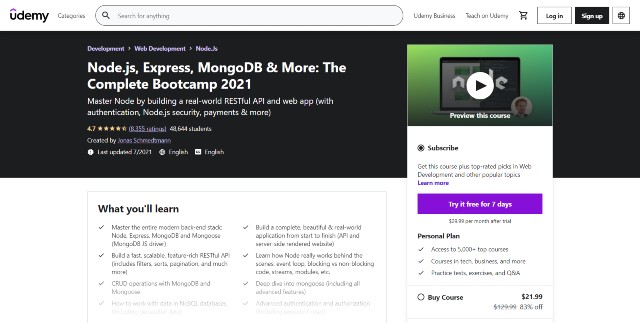
Course Content
Below is a summary of this course’s curriculum.
- Introduction to Node.js and NPM (Node’s asynchronous nature, HTML Templating, Building a simple web server and API, etc.)
- Review of Backend development concepts
- How Node JS works behind the scenes (Event-Driven Architecture, Streams, Requiring Modules, etc.)
- Review of asynchronous programming in JavaScript
- Deep dive into Express.js (Postman, API Design, Handling requests, Middleware, ESLint, etc.)
- Introduction to MongoDB and its CRUD operations
- Mongoose and how to use it with MongoDB
- Error Handling
- All about authentication, authorization, and app security
- Data Modeling and Advanced Mongoose
- Server-side rendering with Pug Templates
- Adding features to the app
- Version Control (Git) and App Deployment
This course is project-based. You will build a production-ready, scalable, and high-performance web application that you can proudly add to your portfolio while learning Node JS concepts along the way.
The total length of this video course is 42 hours, which is longer than most other courses have offered. The curriculum is one of the most comprehensive as well. You can learn the basics and proceed to advanced concepts, tips, and best practices by taking this one course.
Reviews: 4.7/5.0 (Extremely Positive) from 48600+ students
Pros and Cons
Pros
- Beginner-friendly
- Easy-to-follow, comprehensive curriculum
- In-depth and informative lessons
- Clear, step-by-step explanations with numerous examples
- Offer students significant hands-on experience by completing a huge project.
- High-quality subtitles (not the ones auto-generated by Udemy)
- Lifetime Access + 30-day money-back guarantee
- Inexpensive (cost $20 or even lower when on sale)
Cons
- The Q&A Forum is not very responsive. Some students complained about receiving no replies from the support team.
- Jonas tends to update his course less frequently than other instructors. Hence, some content might be outdated.
2. The Complete Node.js Developer Course (3rd Edition)
The Udemy course from Andrew Mead and Rob Percival is another promising course to learn Node JS. If you are looking for a well-structured course with several real-world projects to complete, this one should be on the radar.
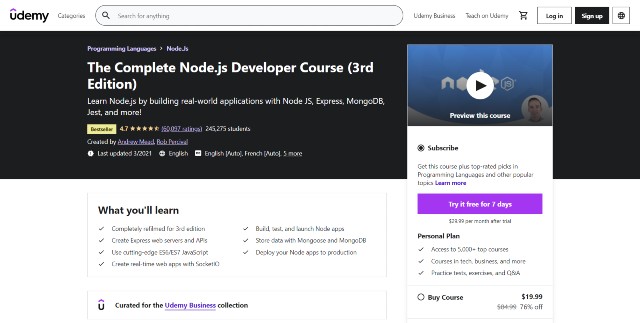
Course Content
What you will learn from the course is as follows.
- Introduction to Node.js and Node Modules
- File System and Command Line Args (Argument Parsing, Storing Data with JSON, Arrow Functions, etc.)
- Writing Asynchronous code in Node JS (HTTP Requests, Callbacks, etc.)
- Setting up Express web servers
- Accessing API from browser + Deploying an application
- MongoDB and Promises
- REST API and Mongoose (Data Validation, Postman, Resource Creation/Reading/Update Endpoints)
- Authentication and Security
- Adding features to your app
- Testing Node.js
- Build real-time web applications (a real-time chat app) with Socket.io
Like the first course, the lessons are project-based. However, you will complete as many as four projects once you reach the end of the curriculum. Each project will be increasingly challenging, which is optimal for students to develop and test their skills.
The cumulative length of the video is 35 hours. The instructor also equips this course with other web development resources that you can download and freely use them.
Reviews: 4.7/5.0 from 245000 students.
Pros and Cons
Pros
- Learn from two leading programming instructors on Udemy
- Well-structured, easy-to-follow curriculum
- Informative lessons
- Easy-to-understand accent, hence optimal for international learners
- Feature four projects that you will build from scratch
- Additional hundreds of exercises to improve your skills
- Include advanced content such as Node JS testing and Socket.io
- Numerous learning resources provided
- Responsive Q&A Forum
Cons
- The pace of the instructors seems to be inconsistent. Several reviewers note that they could be too slow in some parts while providing too few explanations on the other.
3. Learn and Understand NodeJS
Understanding how Node JS works behind the scenes is crucial for anyone who wants to become a professional Node developer. However, there are very few courses that provide insights into the topic.
This course from Anthony Alicea is one of them. Anthony is a web developer with more than ten years of experience. Thus, he understands how these technologies function by heart, and now he is ready to explain them to you in detail.
Once you have gone through its concise curriculum, you will understand how Node JS and relevant web frameworks (i.e., Express framework) work one by one.
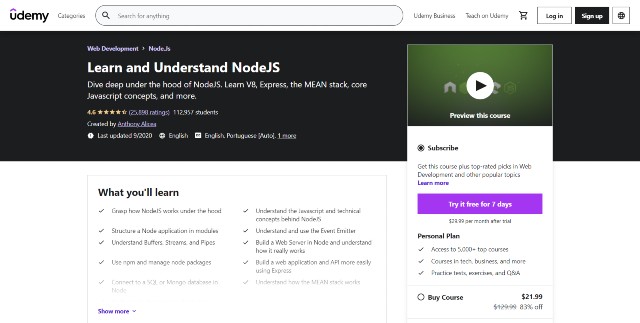
Course Content
Below is a summary of the course content.
- Node.js Core Concepts, V8 (JavaScript Engine), and Node Core
- Modules, Exports, and Require
- Events and Node Event Emitter
- How asynchronous code works in Node JS
- the Event Loop, Streams, Pipes, and Callbacks
- NPM (Node Package Manager)
- Express.js concepts
- The MEAN stack + Database connection
Unlike the previous courses above, this one is not project-based. Anthony will focus mostly on the concepts. The course has only a small project that provides an opportunity to put what you have learned into use.
The curriculum is 13-hour long, which is optimal for a theoretical course.
Reviews: 4.6/5.0 from 112000+ students
Pros and Cons
Pros
- One of the very few courses that explains how Node.js and relevant technologies work in-depth.
- Well-structured curriculum
- Detailed and thoughtful lessons
- Clear explanations with straightforward examples
- Easy-to-understand accent
- Lifetime Access + 30-day money-back guarantee
- Inexpensive (cost $20 or lower when on sale)
Cons
- Anthony does not frequently update the course content (based on my observations, he seems to update only once or twice a year.) Therefore, some sections can become outdated.
4. NodeJS – The Complete Guide (MVC, REST APIs, GraphQL, Deno)
This course from Maximilian Schwarzmüller is one of the most comprehensive courses on Node JS. If you are looking for an all-in-one online for Node.js, this one is a promising candidate.
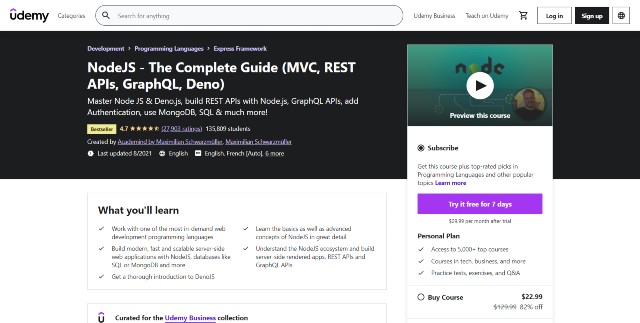
Course Content
This course consists of more than 40 hours of on-demand video, featuring the following topics:
- Install Node JS and JavaScript review
- Node.js Basics (Node Event Loop, Lifecycle, Routing/Redirecting Requests, etc.)
- Deep dive into Express.js
- Adding Template Engines + Handling dynamic content
- MVC (Model-view-Controller) Pattern
- Dynamic Routes and Advanced Models
- Use SQL and Sequelize with Node.js
- MongoDB and Mongoose
- Sessions and Cookies
- Authentication & Validation
- Adding features to the app such as file upload/download, pagination, payments
- REST APIs & GraphQL
- Websockets & Socket.io
- Automated testing for Node applications
- Node JS and TypeScript
- Introduction to Deno
The curriculum is comprehensive and easy to follow. You will start with the basics and progress to more difficult concepts gradually.
In this course, you will work on two projects. The first is an eCommerce application (online shop), while the second is a blog.
Reviews: 4.7/5.0 from 135000+ students
Pros and Cons
Pros
- Comprehensive curriculum
- In-depth and informative lessons
- Cover some interesting concepts and integrations that other courses fail to do so, such as using SQL with Node.js, GraphQL, Automated testing, and Deno
- Max frequently updates his course. Thus, outdated content is rare.
- Lifetime Access + 30-day money-back guarantee
- Inexpensive (you can get it by paying $20 or even lower)
Cons
- Several reviewers believe Max could have done better in explaining advanced concepts. In order words, the explanations are sufficient, or the pace is too fast for some students.
5. NodeJS Tutorial and Projects Course
Suppose you are still not confident in your web development skills. All the above courses would be too challenging.
If that’s the case, you should then consider this project-based Node JS course from John Smilga. I have taken some programming courses with him and appreciate the quality of lessons, so I decided to recommend him to you.
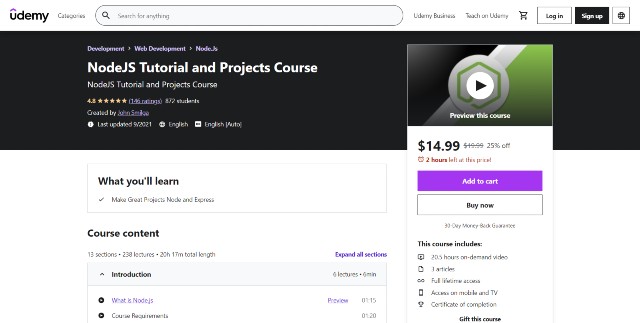
Course Content
Below is a summary of what you will learn from the course.
- Node.js Tutorial: Node Modules, NPM, Event Loop, Async Patterns, Events Emitter, Streams
- Deep dive into Express.js: HTTP Requests, Response Cycle, Params, Express Router, etc.
- Working on APIs (Projects)
- Add features to your app: File/Image Upload, Send Emails, Stripe Payment.
You will learn Node.js mostly from the projects. Currently, you will be working on as many as 5 APIs throughout this 20-hour course.
Unlike other courses, this one is more like an “early access.” John still has plans to add many more lessons to the course. I think the finished product would be 40-50 hours long.
Reviews: 4.8/5.0 from 870+ students.
Pros and Cons
Pros
- John is a highly knowledgeable instructor with exceptional teaching skills. His explanations are clear and easy to follow.
- Informative and in-depth lessons with a focus on “why” and “How to.”
- Include straightforward examples for each lesson that will help your understanding of Node concepts
- John frequently updates his course. Hence, his content is mostly up-to-date.
- Lifetime Access + 30-day money-back guarantee
- Inexpensive (This course costs only $19.99, even without discounts from Udemy)
Cons
- John’s voice is slightly muffled. At first, it will be quite difficult to understand what he says. However, you will gradually be familiar with his voice, and this will not be an issue.
- “Early Access” Product
6. Node JS: Advanced Concepts
If you possess any Node JS skills and would like to strengthen them, this course from Stephen Grider is certainly one of the best available.
Stephen is a software developer with years of experience training numerous several tech companies’ new hires. Hence, he is one of the most high-profile instructors on this list. Learning from the best rarely disappoints!
Note: You should have basic knowledge of Node.js, Express, and MongoDB before taking this course.
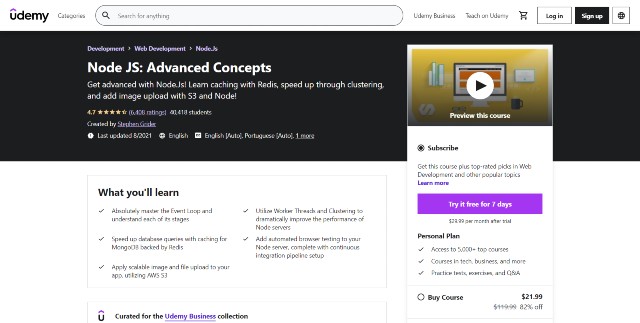
Course Content
What you will learn from this 16-hour course is as follows.
- Node.js Internals – Node Event Loop, Threads, Libuv Thread Pool, OS Operations
- Tips and techniques to enhance Node performance: PM2, Clustering, Webworker Threads, etc.
- Redis Caching (to boost the performance of database queries)
- Automated Testing (Headless Browser)
- Introduction to Continuous Integration (CI) on Travis CI
- Scalable Image/File Upload
- Advanced JavaScript techniques such as ES2015 proxies
This course features advanced topics, tips, and techniques that other Node.js online courses do not cover. Some of these techniques are most suitable for advanced enterprise apps. Hence, if you want to build apps for large companies, taking this course is highly recommended.
Reviews: 4.7/5.0 from 40000+ students
Pros and Cons
Pros
- Learn from an expert in software development
- Well-structured curriculum
- Cover advanced concepts, tips, techniques, and best coding practices
- Clear explanations
- In-depth lessons with excellent examples
- Lifetime Access + 30-day money-back guarantee
- Inexpensive ($20 when on sale)
Cons
- Some sections of the course are outdated. You will need to visit the Q&A forum to get updated information.
- Stephen rarely replies to questions.
Linux Foundation Courses
Suppose you are bored of video lessons or would like to seek more comprehensive and formal training. These Node JS training courses from the Linux Foundation would be among the best you could find.
Unlike Udemy courses, this program has no videos. You will learn by going through text-based hands-on labs and assignments.
Note: The first course is on the edX platform, while the other two courses are on the Linux Foundation platform.
7. Introduction to Node.js
This Node.js tutorial is the first course that everyone should take in the series. It will help you get started with this JavaScript runtime environment. Once you complete the course, you will be ready to navigate and utilize the ecosystem independently.
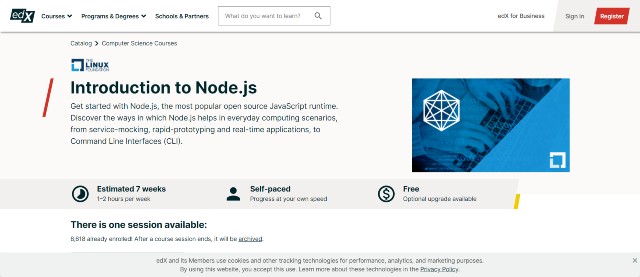
Course Content
This course is quite concise. It consists of only 7-8 hours of content. However, it will equip you with the knowledge to progress to more advanced courses comfortably.
The course outline is as follows.
- Service Mocking of RESTful JSON APIs
- Prototype real-time services
- Build Command Line (CLI) tools
- Navigate the Node JS ecosystem
Once you complete all the lessons, you can take the final exam to receive a certificate. However, the final exam, assignments, and certificate are only available for those who have attended the verified track that costs $149.
I don’t think the verified track is worth $149 or even necessary for your Node.js learning. Thus, it would be best if you select the audit option and take the course for free.
8. Node.js Application Development (LFW211)
The second Node.js course from the Linux Foundation is much longer than the first. Essentially, you will learn how to create Node.js applications, use its core APIs, and grasp optimal use cases.
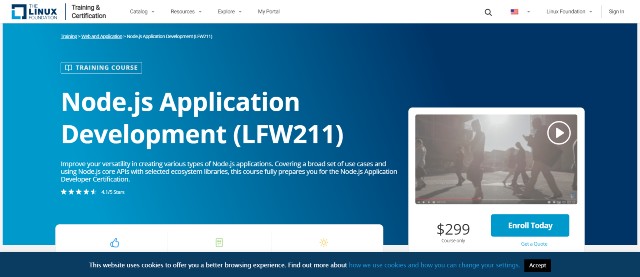
Course Content
The outline of the curriculum is as follows.
- Setting up Node.js + Key JavaScript concepts review
- Node Binary
- Debugging and Diagnostics
- Packages & Dependencies
- Node’s Module System
- Asynchronous Control Flow in Node.js
- Event System
- Buffers & Streams
- Creating Child Processes
- Unit Testing
Most students spend 16-20 hours on the entire course materials. Once you complete them, you will be ready to take the JSNAD Exam to get a Node.js Application Developer certification from OpenJS. This 2-hour exam will test how well you use Node to create web applications.
The tuition for this course is $299. You will be able to access all the course materials for one year. Alternatively, you will need to pay $280 extra if you want to take the exam.
9. Node.js Services Development (LFW212)
This course will drill deeper into Node.js services, including HTTP clients, servers, and RESTful services. You should complete the two previous courses before taking this one.
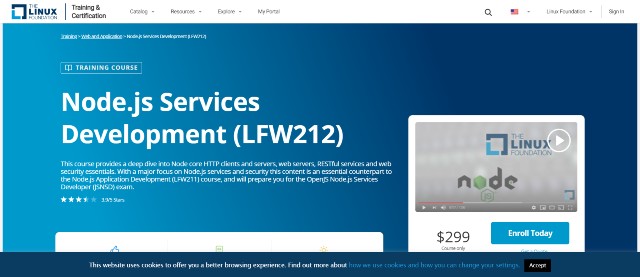
Course Content
The course outline is as follows:
- Creating a web server + Serving Web Content
- RESTful JSON Services
- Data Manipulation + Consuming and Aggregating Services
- Proxy HTTP Requests
- Introduction to Web Security
You will spend at least 20-25 hours on the course. Upon course completion, your skills will be ready for taking another Node.js certification exam (OpenJS Node.js Services Developer.)
Regarding pricing, this course costs $299 and $280 for the certification exam.
Pros and Cons of Linux Foundation Courses
Pros
- Best Node.js courses for those who want to pursue a verified Node JS certification
- Optimal for those who dislike video lessons
- Simple explanations of complex concepts
- Informative lessons
- High-quality hands-on labs and assignments
- The first introductory course is completely free to audit.
Cons
- You have to take all three courses to cover all Node.js concepts, making the training costly compared to alternatives on Udemy.
- Grant only 12-month access
Other Alternatives
Server-side Development with NodeJS, Express, and MongoDB – This minor course is part of the MERN stack specialization from the Hong Kong University of Science and Technology.
The course will explain the server-side development concepts and best practices in great detail, including the practical use cases of Node JS, Express, and MongoDB.
However, this course never receives an update. Most of its content is already outdated. I think it would be better if you consider other alternatives.
Node.js: The Complete Guide to Build RESTful APIs (2018) – This course from Mosh Hamedani used to be an excellent option for learning Node JS. However, it has received no update since April 2018. The content and the code are now entirely outdated.
Node.js API Masterclass With Express & MongoDB – This Udemy course from Brad Traversy was another excellent Node.js course. However, Brad has not updated the content since 2019. Hence, I don’t think the course is worth taking at this point.
Free Node and Express Course – Freecodecamp offers a free course on Node and Express. However, the depth of the course is no match to paid Udemy courses.
Codecademy’s NodeJS course – Codecademy provides interactive Node.js training, which is beginner-friendly. However, the course content only touches the basics. It will not be optimal if you want to build your practical skills.
Related Courses
Below are additional lists of courses that you may find beneficial in strengthening your web developer skills.
Angular – A web framework used by millions of web developers to build user interfaces and the front-end of web applications.
React – One of the most popular JavaScript libraries for building engaging UI components, user interfaces, and other front-end elements.
Vue – A JS framework that has been rising in popularity in recent years. Vue is optimal to build the front-end of web applications.